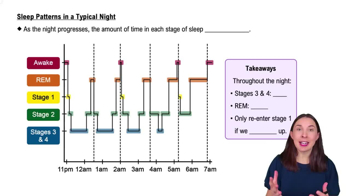Table of contents
- 1. Introduction to Psychology1h 43m
- 2. Psychology Research2h 20m
- 3. Biological Psychology2h 41m
- 4. Sensation and Perception28m
- 5. Consciousness and Sleep32m
- 6. Learning41m
- 7. Memory34m
- 8. Cognition37m
- 9. Emotion and Motivation35m
- 10. Developmental Psychology33m
- 11. Personality48m
- 12. Social Psychology41m
- 13. Stress and Health41m
- 14. Psychological Disorders44m
- 15. Treatment47m
5. Consciousness and Sleep
Sleep
Struggling with Psychology?
Join thousands of students who trust us to help them ace their exams!Watch the first videoMultiple Choice
_____ causes dehydration and a rise in body temperature.
A
Heroin
B
Nicotine
C
Cocaine
D
MDMA
 Verified step by step guidance
Verified step by step guidance1
Identify the key symptoms mentioned in the problem: dehydration and a rise in body temperature.
Understand that these symptoms are commonly associated with certain substances that affect the body's thermoregulation and hydration levels.
Recall that MDMA (3,4-methylenedioxymethamphetamine), also known as ecstasy, is a psychoactive drug known to cause these specific symptoms.
Differentiate MDMA from the other substances listed (Heroin, Nicotine, Cocaine) by considering their primary effects and typical side effects.
Conclude that MDMA is the substance that most directly causes dehydration and a rise in body temperature, aligning with the symptoms described.

 3:25m
3:25mWatch next
Master Circadian Rhythms with a bite sized video explanation from Hannah Gordils
Start learningRelated Videos
Related Practice


































































































![Race, Genes and IQ Differences | Bret Weinstein [Mini Clip]](https://img.youtube.com/vi/IztL_m3pd70/mqdefault.jpg)



































































































